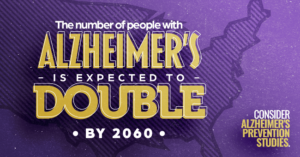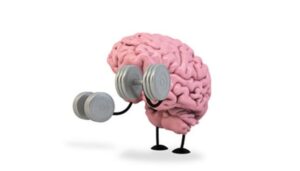Alzheimer’s is a disease where proteins build up in the brain to form structures that cause brain cells to die. In turn, these plaques or “tangles” affect the functions controlled by the brain. Alzheimer’s disease is more prevalent in people after the age of 65. However, early onset or “younger onset” Alzheimer’s is when symptoms begin before age 65.
Alzheimer’s is not just a disease of old age.

When Alzheimer’s disease affects a person under 65, we refer to it as early or younger onset. People with younger onset Alzheimer’s can be in any stage of the disease. Most individuals with early onset Alzheimer’s have sporadic Alzheimer’s disease. This is the most common form of Alzheimer’s and is not always due to genetics. Early onset symptoms closely mirror those of other forms of Alzheimer’s disease, including the following early-stage signs:
- Memory issues, mainly new information or important dates
- Asking about the same information again and again
- Trouble keeping track of bills or following a favorite recipe
- Losing track of the current date, time, or year
- Getting lost and not knowing how you got there
- Depth perception problems or other vision issues
- Difficulty finding the right words for things and joining conversations
- Misplacing things and not being able
- Using poor judgment more often
- Loss of interest and withdrawal from work and social situations
- Mood and personality changes
However, researchers know genetics play a role in Alzheimer’s. Risk genes increase the likelihood of developing a disease but do not guarantee it will happen. And there are deterministic genes that directly cause a disease, guaranteeing that anyone who inherits them will develop the disorder.

Can early onset Alzheimer’s be prevented?
Though we’re still learning more every day, how to prevent Alzheimer’s disease remains elusive to scientists and researchers. We know that detecting the disease early can lead to better treatment options and are an opportunity to play a role in planning your future financial and care options.
Although more research is needed, encouraging evidence has been shown for three types of interventions when it comes to potentially delaying or preventing Alzheimer’s:
- Increased physical activity– There’s no doubt that regular exercise has many health benefits. Exercise has been linked with fewer Alzheimer’s plaques and tangles, while other evidence shows it lowers the risk for cognitive decline.
- Managing blood pressure – Studies show a connection between high blood pressure, cerebrovascular disease (a disease of the blood vessels supplying the brain), and dementia.
- Cognitive training– Involves structured activities designed to enhance memory, reasoning, and processing speed.

Alzheimer’s prevention studies may help!
To move toward more effective treatments, scientists and researchers need to understand the various processes involved in early onset and the more traditional form of Alzheimer’s disease. By participating in clinical research prevention studies, you can help us learn about the causes so we can develop better treatments for Alzheimer’s disease.

To learn more, visit our website or contact us at (678) 494-5735 today!
Sources:
https://www.alz.org/help-support/i-have-alz/younger-onset
https://www.mayoclinic.org/diseases-conditions/alzheimers-disease/in-depth/alzheimers/art-20048356

